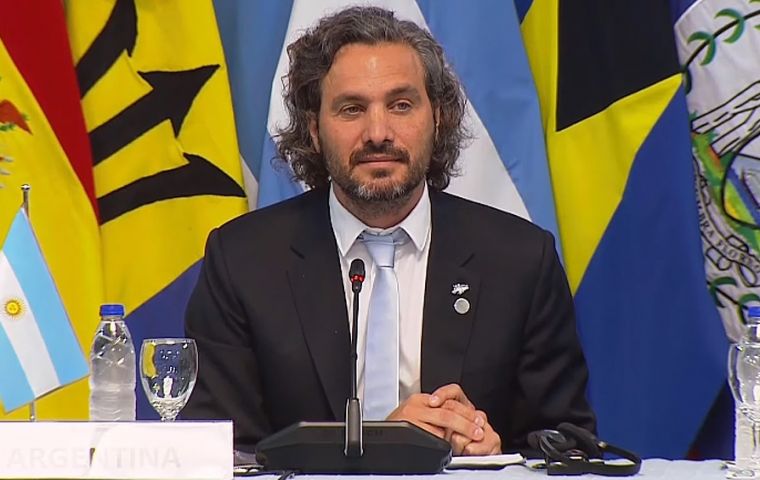MercoPress. South Atlantic News Agency
ECLAC's 39th session gets underway in Buenos Aires
 ECLAC foresees the economies in Latin America and the Caribbean will grow by 3.2 % in 2022 and 1.4 % in 2023
ECLAC foresees the economies in Latin America and the Caribbean will grow by 3.2 % in 2022 and 1.4 % in 2023 Argentine President Alberto Fernández and Economic Commission for Latin America and the Caribbean (ECLAC) Executive Secretary José Manuel Salazar-Xirinachs Monday opened the United Nations agency's 39th session in Buenos Aires.
Also taking part in the event was Costa Rica's Foreign Minister Arnoldo Andre Tinoco representing the country where the previous gathering took place to formally relay the baton to this year's organizers.
Monday's event at the Kirchner Cultural Center (CCK) in the Argentine capital featured a recorded message from UN Secretary-General António Guterres, who thanked ECLAC “for seeking innovative solutions based on multilateral cooperation.”
“In addition to the impacts of the pandemic, there are also those derived from the war in Ukraine. ECLAC estimates that 16 countries have not recovered their pre-pandemic GDP levels,” Guterres said.
The Portuguese diplomat also stressed that ECLAC's goal was to “energize productive systems and boost social inclusion, a green transition, and a just digital revolution.”
He also called for the implementation of a stimulus plan for the Sustainable Development Goals (SDGs) to provide a massive boost for sustainable development in countries, including middle-income countries amid a “critical” global situation.
President Fernández said that “the current situation requires us to take a critical look and innovative responses to design policies and solutions made in and for Latin America and the Caribbean.”
He added that in Latin America “the gap between rich and poor is the widest in the world”, and called for “finding ways to avoid postponing the development of societies that need to grow within a framework of greater equity.”
“The fact that we have survived such a tremendous time imposes on us the ethical imperative to change this present. It is time to tear down walls and build bridges. We have a moral duty to unite in this common effort,” urged Fernandez.
Salazar-Xirinachs underlined that Latin America and the Caribbean were “in need of and desirous of bold, transformative policies that offer realistic and pragmatic solutions to its acute shortages and economic, social and environmental gaps, and that resolve many of its most basic needs.”
He also highlighted the presentation of the document “Towards the transformation of the development model in Latin America and the Caribbean: production, inclusion, and sustainability” in order to “move forward, not backward.”
In the document, ECLAC pointed out ten “drivers of sustainable development” as well as a set of monetary and fiscal policies to overcome current difficulties and move towards this model.
The five-chapter text mentions energy transition, electromobility, circular economy, bioeconomy, digital transformation, health manufacturing, circular economy, sustainable tourism, and harnessing the potential of small and medium-sized industries as priority areas for transitioning to a new development paradigm.
It also points to macroeconomic policies at the regional level to accelerate growth and combat inflation through consistent monetary policies and fiscal measures that accelerate investment.
“Recent ECLAC forecasts show a slowdown in the growth of economic activity, with a significant stagnation of investment. Likewise, a slow recovery of employment is foreseen, with a considerable increase in informality. Added to this is an increase in inflation to levels not seen since the global financial crisis, underpinned by higher external inflation and the high cost of energy and food on international markets,” said the organization.
According to ECLAC, the inflation rate in the region reached 8.4 % last June, 1.8 %age points above the one recorded during the global financial crisis. ECLAC also estimated that the economies of Latin America and the Caribbean will grow by 3.2 % in 2022 and “a strong deceleration is expected with a projected growth of 1.4 % in 2023.”
The organization also recommended promoting investments and financing to accelerate the energy transition, guarantee universal access to electricity, create green jobs and develop renewable energy value chains as vectors for development and energy security.
”ECLAC (2020) showed that, with annual investments equivalent to 1.3 % of regional GDP for a decade, greater regional electricity integration and 100 % of renewable energies in electricity generation would be achieved, with a 31.5 % reduction in carbon dioxide (CO2) emissions, and seven million new green jobs would be created, with the corresponding salary income,“ the document pointed out.
Among the energy challenges, the development of the green hydrogen value chain was described as ”imperative“ and ”feasible,“ while the role of lithium in the transition to electromobility was highlighted.
”The region can take advantage of the potential of green hydrogen not only for the energy transition and the long-term decarbonization of its economies but also to generate a new style of fair and sustainable development,“ ECLAC argued. It also recommended increasing investments in key sectors for digital transformation with a doubling, by 2030, of investments in the electronics and IT sectors. ECLAC then called for an increase in public spending on health, including the pharmaceutical industry, while in relation to the circular economy, it urged promoting better use of materials in the economy by doubling investments in recycling by 2030.
Meanwhile, Argentine Foreign Minister Santiago Cafiero pointed out that ”inequality challenges us“ to ”reduce the gaps“ between developed and developing countries.
Cafiero also explained that since its foundation in 1948, ECLAC ”was never a bureaucratic organization, it always had life, soul, spirit“ and that ”it did not stay only in principles.“
The hosting minister also said the ECLAC document constitutes ”a valuable road map, with precise diagnoses of the region and of a world in uncertainty.”




Top Comments
Disclaimer & comment rulesCommenting for this story is now closed.
If you have a Facebook account, become a fan and comment on our Facebook Page!